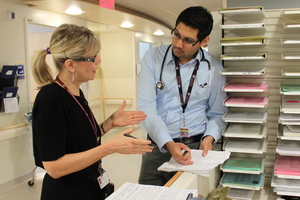



The Doctor-Patient Relationship
The student begins with the patient, continues with the patient, and ends his studies with the patient, using books and lectures as tools, as means to an end. - Sir William Osler
The relationship between physician and patient is central to our work - this relationship underpins all other interventions.
An effective doctor-patient relationship helps with:
identifying the health issues
organizing plans
maintaining patient confidence
physician work satisfaction and well-being
Difficult communications, or difficult interactions with angry and dissatisfied patients can be upsetting, emotionally draining and stressful.
Skill, expertise and lots of practice are required to be an effective communicator. Patients and families expect this of us.

Much has been written about the doctor-patient (or physician-patient, client-physician) relationship. However you name it, the elements of effective and appropriate communication must be maintained.
 Previous
Previous